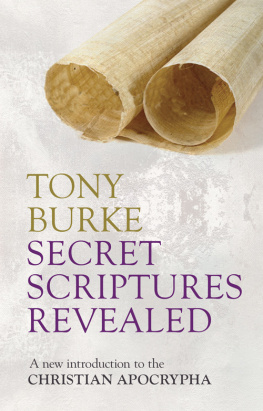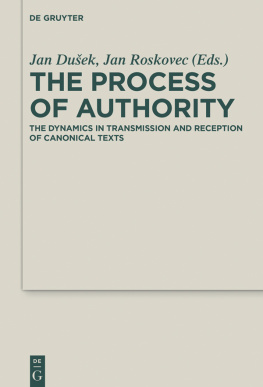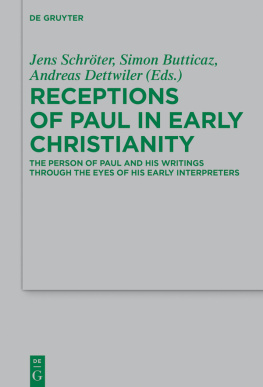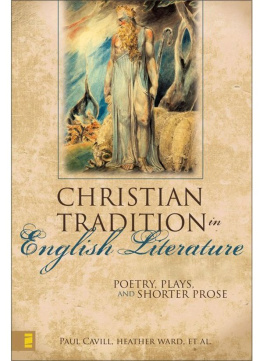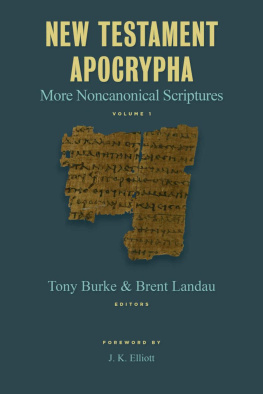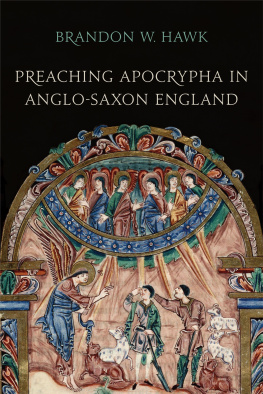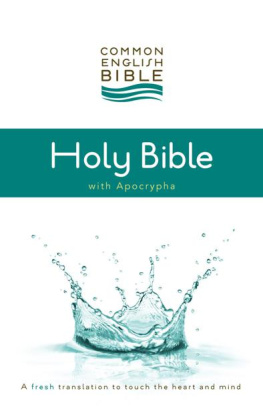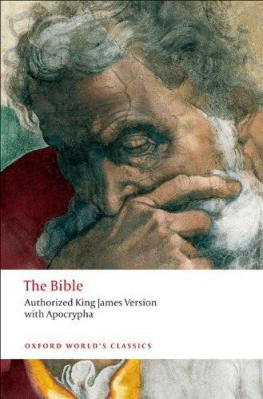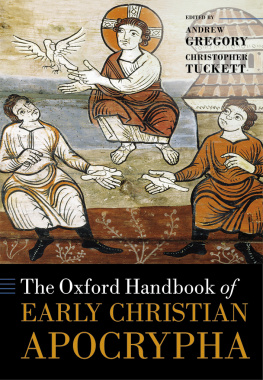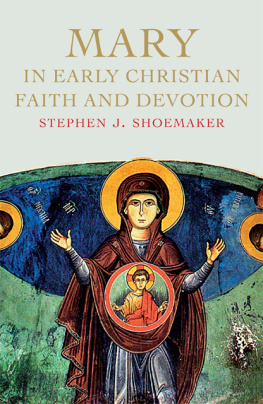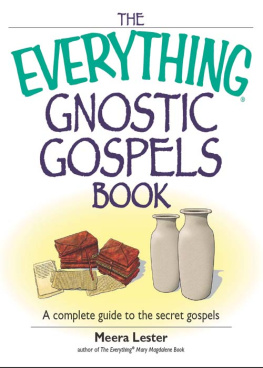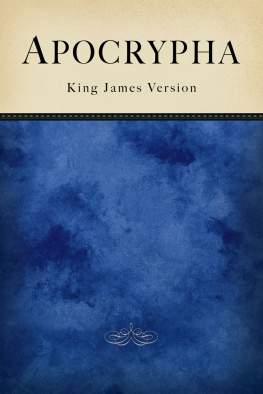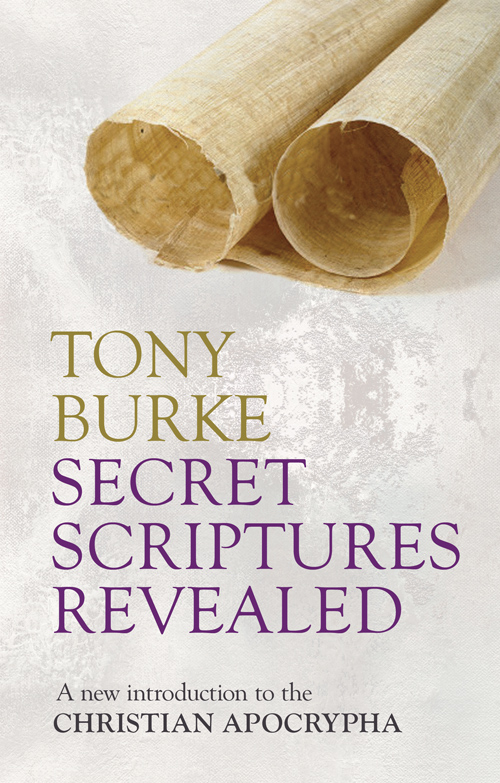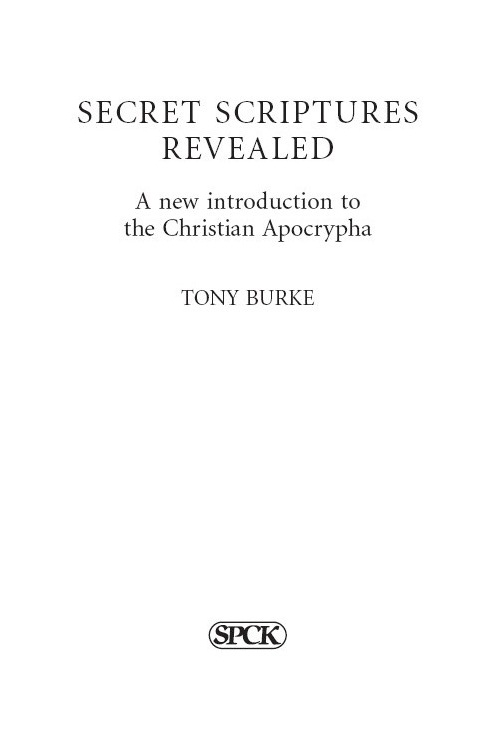First published in Great Britain in 2013
Society for Promoting Christian Knowledge
36 Causton Street
London SW1P 4ST
www.spckpublishing.co.uk
Copyright Tony Burke 2013
All rights reserved. No part of this book may be reproduced or transmitted in any form or by any means, electronic or mechanical, including photocopying, recording, or by any information storage and retrieval system, without permission in writing from the publisher.
SPCK does not necessarily endorse the individual views contained in its publications.
The author and publisher have made every effort to ensure that the external website and email addresses included in this book are correct and up to date at the time of going to press. The author and publisher are not responsible for the content, quality or continuing accessibility of the sites.
Scripture quotations are taken from the New Revised Standard Version of the Bible, Anglicized Edition, copyright 1989, 1995 by the Division of Christian Education of the National Council of the Churches of Christ in the United States of America, and are used by permission. All rights reserved.
British Library Cataloguing-in-Publication Data
A catalogue record for this book is available from the British Library
ISBN 9780281068456
eBook ISBN 9780281068463
Typeset and eBook by Graphicraft Limited, Hong Kong
Contents
Secret Scriptures Revealed is my dream project. My entire professional life has been dedicated to the Christian Apocrypha beginning with my doctoral work on the Infancy Gospel of Thomas and continuing to today with the creation of the York University Christian Apocrypha Symposium Series and the More Christian Apocrypha Project. The texts have informed my teaching also; even in classes that are not part of my courses on New Testament Apocrypha and Gnosticism, I mention apocryphal texts in my lectures as often as possible, though it may seem as though they have little to do with the days topic. I do this because I think its important to bring attention to these texts; they form a body of literature that is so important for understanding Christian history and culture. But I also do it because the texts are just plain fun. And I believe strongly that scholars need to share the results of their work with the wider public. So this new introduction to the Christian Apocrypha fulfils many of my goals as a teacher and a scholar. I am truly grateful to SPCK for inviting me to write this book.
My thanks go to my friends, family and colleagues Laura Cudworth, Ted Cudworth, Brent Landau, Zeba Crook, Lee Martin McDonald, Stephen Shoemaker, and the members of the KitchenerWaterloo Biblical Colloquium who read portions of the book and provided feedback. Most of all, I want to thank my editor Lauren Zimmerman for her encouragement, assistance and patience in seeing this project through to its completion.
Secret Scriptures Revealed is dedicated to my teacher Harold Remus, who introduced me to the Christian Apocrypha many years ago and who has been a source of inspiration and support throughout my career.
Tony Burke
Ten years ago, few people besides biblical studies scholars knew much about apocryphal Christian literature defined, in short, as stories about Jesus and his contemporaries similar to New Testament texts but, for one reason or another, not included in the Bible. I remember awkward situations at parties when non-academics would ask me what I did for a living. Nothing could kill a conversation faster than saying, I study apocryphal gospels.
But that all changed in 2004 with the publication of Dan Browns novel The Da Vinci Code . For the few people in the world who have not read the book or seen the 2006 blockbuster film adaptation, The Da Vinci Code is the rarest kind of best-seller: a religious thriller. The plot hinges on the murder of a member of a group charged to safeguard the secret of the Holy Grail here explained, not literally as the chalice used by Jesus at the last supper, but symbolically as Mary Magdalene, the woman who carried the bloodline of Jesus. Thats right: the novel says she was Jesus wife and mother of his only child. The details of this shocker are revealed in the novel through readings from apocryphal gospels. In the Gospel of Philip , Mary Magdalene is named as the spouse of Jesus, and we read that he used to kiss her often on her mouth. And according to the Gospel of Mary Magdalene , Jesus charged Mary, not the sexist apostle Peter, to carry on his Church. We learn also about the existence of more than eighty gospels, many of which describe the ministry of Jesus in very human terms. These gospels were censored by the Church, which sought, for political reasons, to portray Jesus, not as a man, but as the Son of God.
These statements, though certainly shocking, are not entirely new. The Da Vinci Code is one of over 40 secret scrolls novels that use apocryphal texts, whether real or imagined, as the crux of their plots. What, then, made Browns novel so different, and so successful? The answer comes in the opening page of the book, which lists several points as fact, and asserts that all descriptions of artwork, architecture, documents, and secret rituals in this novel are accurate. Could this be true? Do apocryphal gospels, suppressed by the Church for centuries, really say that Jesus was just a man, that he was married, had a child, and that the Church founded in his name was stolen from his rightful successor? Readers of The Da Vinci Code were desperate for answers. Books were written both supporting and challenging Browns claims. Churches scrambled to prevent wide-scale abandonment of the faith by forming study groups to channel interest in the book into re-engagement with the Church. And Christian Apocrypha scholars found themselves thrust into the spotlight by news media eager for a response to the furore.
The excitement over the Christian Apocrypha continued to build with the publication of the long-lost Gospel of Judas in 2006. The team of scholars who worked on the text claimed that it portrayed Judas as a hero, not a villain, and the team used the discovery to add fuel to the fire of one of Browns arguments that history is always a one-sided account written by the winners. The Gospel of Judas represented one of many forms of early Christianity, each with its own, equally valid views on Jesus, but not the views of the winners who compiled the New Testament. Then, in 2012, news media and internet bloggers debated the authenticity of the Gospel of Jesus Wife , a newly revealed fragment from an ancient text in which Jesus is asked by his disciples about Mary (likely Mary Magdalene), whom Jesus appears to refer to as his wife. For better or worse, the Christian Apocrypha have become an indelible part of popular consciousness. Not only that; theyre downright sexy.
As it turns out, many of Dan Browns claims about the Christian Apocrypha are not fact at all. The texts he uses to advance the plot do not portray Mary Magdalene as the wife of Jesus. Nor do they portray Jesus as entirely human. In fact, the gospels of Philip and Mary establish that Jesus is more divine than his biblical counterpart, not less, and are related to a form of Christianity that encouraged sexual abstinence. Browns historical faux pas (and there are many) have been a source of much irritation for biblical scholars and historians, but they are more distracting than destructive The Da Vinci Code is only a novel, after all. What is truly disturbing is the reaction to the book from non-specialists in the field. Most of the books and articles critical of the Christian Apocrypha are written by North American evangelicals eager to champion the New Testament as containing the truth about the life and teachings of Jesus and as representing the accurate history of the early Church. They call for their readers to keep away from apocryphal texts; one writer even declares that scholars of the Christian Apocrypha, though bright and sincere, are not merely wrong; they are misled. They are oblivious to the fact that they are being led down this path by the powers of darkness. Not content with merely pointing out problems with Browns version of the history of the Church, or with the sensational claims sometimes made by legitimate Christian Apocrypha scholars, modern critics of the Christian Apocrypha want to smother conversation on the texts by pushing them back into the margins of history. They characterize the Apocrypha as late texts, not early; written to destroy Christianity to promote error, not truth. They are fakes, forgeries and fictions.

